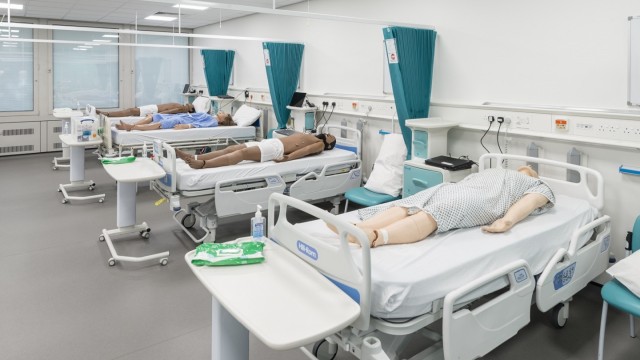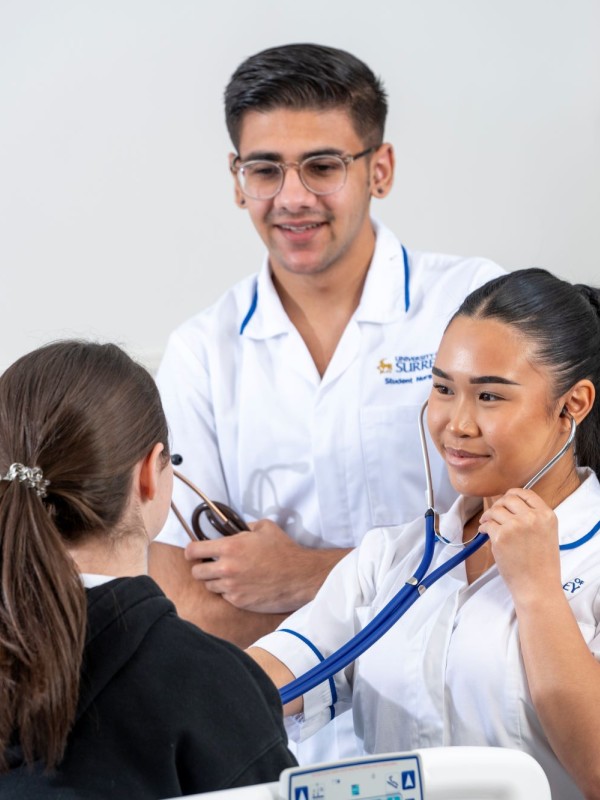
- Healthcare Practice
BSc (Hons) — 2026 entry Healthcare Practice
On our Healthcare Practice BSc (Hons), you’ll benefit from an individual learning programme tailored to your area of clinical expertise. Our curriculum is designed to nurture your knowledge, aptitude and skills to advance your career in healthcare.
Why choose
this course?
- Access our Clinical Simulation Centre, including our Immersive Learning Environment and Critical Care Unit, to practise real scenarios on lifelike manikins and actors.
- Learn from a multidisciplinary team of lecturer, many of whom are healthcare professionals, with experience of working in the NHS.
Statistics
7th in the UK
For nursing in The Times and The Sunday Times Good University Guide 2025
7th in the UK
For nursing in the QS World University Subject Rankings 2024
What you will study
You’ll develop an enquiring, critical and innovative approach that will support your practice and enable you to provide high-quality healthcare. While exploring advanced conceptual models, theories and frameworks, you’ll also learn how to develop and evaluate healthcare strategies, to improve your own practice and grow as a healthcare professional. You’ll learn how to utilise a range of resources to effectively lead and manage the development of self, others and the service.
You’ll also understand how to apply professionalism to all aspects of your role, while communicating and working in partnership with colleagues from a range of disciplines, to explore issues from practice.
You’ll study topics, including the application of decision-making, leadership and management, personal development and service transformation.
Clinical practice
On our practice focused modules, you’ll develop your knowledge and skills within the health and social care setting that you currently work in, under the supervision of qualified practitioners.
Your UK healthcare workplace will need to provide you with a practice assessor and supervisor. They’ll simultaneously support and evaluate your practice abilities throughout the course.
This course can only be taken part-time, this can take between two to five years to complete. This is dependent on how many modules you select to study at a given time.
The structure of our programmes follow clear educational aims that are tailored to each programme. These are all outlined in the programme specifications which include further details such as the learning outcomes.
Modules
Modules listed are indicative, reflecting the information available at the time of publication. Modules are subject to teaching availability, student demand and/or class size caps.
The University operates a credit framework for all taught programmes based on a 15-credit tariff.
Course options
Unstructured years
Semester 1
Core
This module is designed to meet the needs of professionals working in health and social care who are interested in introducing change within their practice environment. The module will explore the current healthcare agenda, examining the need for change to meet the contemporaneous needs of the population. Students are encouraged to reflect upon how innovative practice could transform service delivery to improve experience quality, relative to their own area of practice.
View full module detailsThe focus of this module is unusually on you as an individual. We examine where you currently feel you are in the context of your professional, personal, and academic journey. As professionals working within health and social care environments, much of our daily focus is on others, this module provides students with an opportunity to pause, to reflect, assess and evaluate what you need to develop within your career. This is a great first module for students returning to study, or for anyone wanting to refocus, as the journey of discovery leads to deep learning and enhanced confidence in your professional, personal and academic needs, so provides a direction for future development.
View full module detailsThis module empowers health and social care professionals to examine the factors contributing to workplace safety and the care of patients/service users, considering the influence of human factors on safety. Additionally, the module encourages students to critically assess the interplay between national patient safety policies and their impact on local guidelines and policies. Moreover, students will cultivate a critical understanding of the intricate legal and ethical issues affecting patient safety. They will also scrutinise the role of accountability in effectively managing safety and risk in the workplace.
View full module detailsSemester 2
Core
This module is designed to enable students to reflect upon their own leadership and management skills, considering opportunities for development. They will be able to appreciate how theories of leadership and management can underpin the process of leading and managing in healthcare organisations.
View full module detailsThis module provides students with a fundamental understanding of the core principles of engaging, supporting and leading people. Students will be empowered to support or create workplaces where staff thrive and collaborate, enabling patients and users of health and social care services to feel safe and supported. Exploring the concepts of care, compassion, courage, and vulnerability, to develop skills in enhancing relationships and creating safe environments.
View full module detailsSemester 1 & 2
Core
In this module, the students will acquire vital research and evidence-based practice skills. They will learn how to effectively complete a literature search, and how to review and critically appraise research articles. They will develop critical appraisal skills for both qualitative and quantitative research, understanding key research and evaluation stages as part of this process and considering the role of ethics and research governance. The students will gain autonomy in conducting literature reviews and project proposals, to support their development as evidence-informed practitioners.
View full module detailsThis module will explore the role of decision making within the healthcare environment. It will support students' exploration of their understanding and knowledge of the theory underpinning decision making, judgement and human factors within healthcare, and the potential influential factors including; policy, risk, finances, ethics, the environment, shared decision-making, and the actual and potential consequences of the decision.
View full module detailsOptional modules for Unstructured (2-5 years) - FHEQ Level 6
For further information regarding programme structure and module selection, please refer to the course catalogue.
Teaching and learning
You’ll learn from a multidisciplinary team of lecturers who are all healthcare professionals, which may include adult nurses, children’s nurses and paramedics. You’ll also be taught by guest lecturers, made up of local doctors, nurses, midwives and other healthcare workers.
Your teaching will be delivered through a combination of:
- Group work (e.g. discussion groups)
- Lectures
- Online learning
- Practical simulation classes and clinical skills scenarios
- Role plays
- Seminars
- Tutorials.
Outside of these, you’ll be expected to carry out independent study, including coursework, essays and reading.
Assessment
We use a variety of methods to assess you, including case studies, examinations, presentations, simulated learning experiences (objective structured clinical examinations – OSCEs) and written work. When you’re in clinical practice, your knowledge, skills and professional behaviour will be assessed by your practice assessor and practice supervisor.
Check individual module information to see full details at a module level.
General course information
Contact hours
Contact hours can vary across our modules. Full details of the contact hours for each module are available from the University of Surrey's module catalogue. See the modules section for more information.
Timetable
New students will receive their personalised timetable in Welcome Week. In later semesters, two weeks before the start of semester.
Scheduled teaching can take place on any day of the week (Monday – Friday), with part-time classes normally scheduled on one or two days. Wednesday afternoons tend to be for sports and cultural activities.
View our code of practice for the scheduling of teaching and assessment (PDF) for more information.
Location
Our Medicine (Graduate Entry) BMBS degree, nursing and midwifery, and health science courses are taught at the Kate Granger Building (30 Priestley Road), on the Surrey Research Park.
For some modules, elements of assessments will be completed at your practice location.
We offer careers information, advice and guidance to all students whilst studying with us, which is extended to our alumni for three years after leaving the University.
Our course allows you to broaden your education, focus on your specialist area of practice and meet the educational needs of your employer or prospective employer. We’ll help you stay competitive in the job market as a healthcare professional, developing your practice abilities and expanding your knowledge, so you can compete with recent graduates.
99 per cent of our health sciences graduates go on to employment or further study (Graduate Outcomes 2024, HESA). They work for the NHS, private healthcare organisations and academic institutions.
Visit the NHS careers website for further information on healthcare roles.
Please note, this course doesn’t give access to registration with the UK Nursing and Midwifery Council (NMC) and the Health and Care Professions Council (HCPC).
You’ll benefit from our multimillion-pound facilities, home to our Clinical Simulation Centre that includes two wards, a Critical Care Unit and a Community Flat. Our Immersive Learning Environment, lifelike manikins and actors will transport you to the centre of hospital wards, so you can practise your skills in scenarios you may face in practice.
You’ll also get exclusive access to our Independent Clinical Learning Space, set up each week with the necessary equipment required to practise the techniques you’ll be learning.
Learn more about the qualifications we typically accept to study this course at Surrey.
Students will normally hold a previously accumulated credit volume of 120 credits at level 4 and 120 credits at level 5.
Where students do not have the required credits, they will be able to apply through the Recognition of Prior Learning (RPL) process to have alternative learning accredited.
Students are required to be registered on the appropriate part of the NMC or HCPC register and working currently as a Healthcare Practitioner within a UK healthcare setting.
English language requirements
IELTS Academic: 7.0 overall with 7 in each element.
View the other English language qualifications that we accept.
If you do not currently meet the level required for your programme, we offer intensive pre-sessional English language courses, designed to take you to the level of English ability and skill required for your studies here.
Selection process
Applications will be reviewed on an individual basis and potential students will be offered advice by an academic tutor on the suitability of the award and their module choice within the award. This is dependent on factors such as currency of prior learning, and their personal and professional development needs.
Students should be able to show potential benefits from studying for the award and a commitment to attempting the assessment items. If students have not studied on an academic course within the last five years, they may be asked to carry out an academic piece of writing as part of the selection process.
International students travelling to the UK
Due to the module structure of this programme, we are unable to provide sponsorship on the Student Route. International students should make use of the Visitor Visa Route to attend the practical component of the programme. Further details can be found on our apply for a visa page.
Unfortunately, the University cannot guarantee that Visitor Visa applications will be successful, and a refusal may result in students being unable to successfully complete the programme.
Fees
The majority of students on this course will be funded through sponsorship arrangements with their NHS trust employer.
If you would be self-funding, please contact postreg_admin@surrey.ac.uk for information regarding the fees.
Additional costs
- Travelling expenses such as those incurred for travelling between their clinical practice area and the University.
- General programme related costs such as study materials.
- Potential costs involved in working/studying remotely e.g. internet connection etc.
Apply for this course via our online application portal.
About the University of Surrey
Need more information?
Contact our Admissions team or talk to a current University of Surrey student online.
Terms and conditions
When you accept an offer to study at the University of Surrey, you are agreeing to follow our policies and procedures, student regulations, and terms and conditions.
We provide these terms and conditions in two stages:
- First when we make an offer.
- Second when students accept their offer and register to study with us (registration terms and conditions will vary depending on your course and academic year).
View our generic registration terms and conditions (PDF) for the 2024/25 academic year, as a guide on what to expect.
Disclaimer
This online prospectus has been published in advance of the academic year to which it applies.
Whilst we have done everything possible to ensure this information is accurate, some changes may happen between publishing and the start of the course.
It is important to check this website for any updates before you apply for a course with us. Read our full disclaimer.








